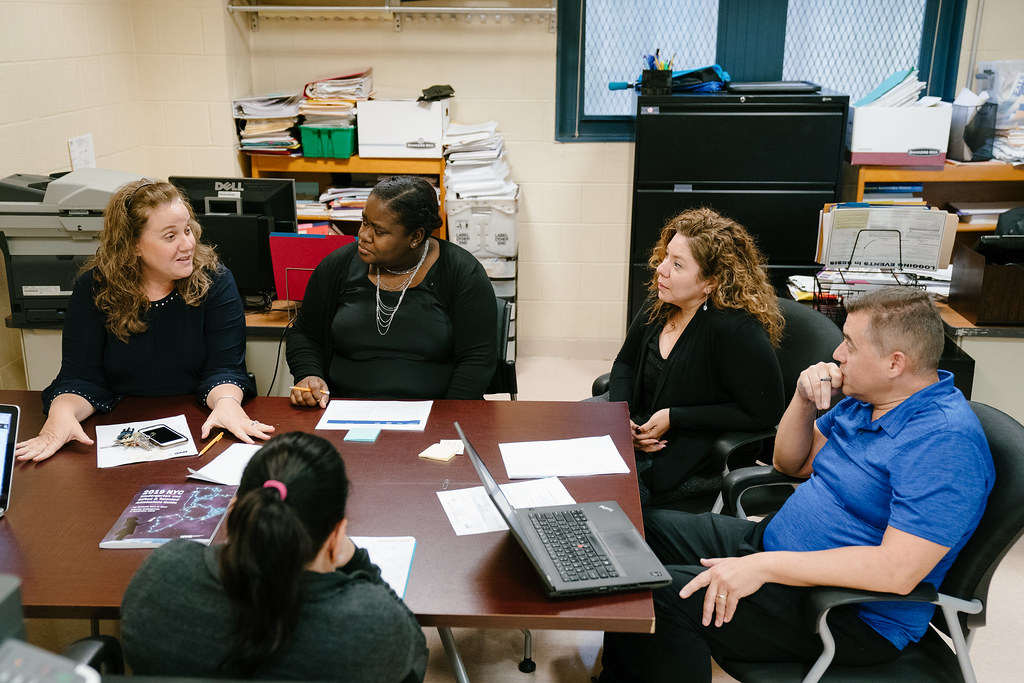Tiered System of Supports: Engaging In Holistic Discussions About Students

“Tiered Supports meetings focus on sharing information about the student and their context, and efforts will be made to determine factors that create or reinforce adverse experiences for students.”
 By Dawn Foreman, M. Ed. and Renee Prince, LCSW
By Dawn Foreman, M. Ed. and Renee Prince, LCSW
Once educators have identified students who need additional supports and designed a process for referring students, it’s time to ensure a structure is in place for engaging in comprehensive, holistic conversations about students who need additional support. This third phase of Turnaround for Children’s Tiered System of Supports is called the Collaboration Phase.
Like the Identification and Referral phases, the Collaboration Phase also requires that educators collect and reflect on student data and their own mindsets and practices that support collaboration.
Having a deep understanding of their role in the Tiered System of Supports process will not only assist educators in their consideration about the appropriate level of support, it will also allow them to leverage that support in a way that provides a quality experience for all students and stakeholders.
The Collaboration Phase is an aspect of both Tier 2 and Tier 3 referral processes. During this phase, teachers discuss students in a 1:1 setting with a member of the Student Support Team or during a meeting with their peers for Tier 2 levels of support. For Tier 3 levels of support, students are discussed during a meeting with multiple stakeholders, including the referring individual.
All Tiered System of Supports meetings focus on sharing comprehensive information about the student and their context, determining the factors that create or reinforce adverse experiences for students, and brainstorming potential ways to address those factors. This is done while prioritizing and leveraging assets of the student (and/or family, where appropriate) and a diverse set of stakeholders. Meetings during this phase make space for teachers and other team members to determine goals, select interventions/supports, determine a process for progress monitoring, and select a review date—all of which is recorded on the Student Support Plan.
There are several benefits to conducting structured meetings about students collaboratively, with a diverse set of perspectives, through an equitable whole-child design lens:
- There is an increased likelihood that processes and protocols are implemented with fidelity, improving the ability for more children to receive appropriate support sooner.
Input from multiple stakeholders improves the quality of support offered and the student’s overall school experience. - Inclusion of varied perspectives is an equitable practice and will contribute to more equitable outcomes.
- Teachers feel supported and families feel included, making way for true shared ownership and accountability.
- Sustainable protocols will help to eliminate additional meetings due to challenges with membership participation or lack of data.
School teams are able to document trends, address any potential areas for growth, and apply supports in a more proactive manner, which can benefit all students.
Placing emphasis on understanding the context of the whole child provides the opportunity for school staff to think holistically, likely reducing the use of punitive responses and allowing for increased instructional time for students.
There is an increase in a positive/supportive environment for both students and staff.
Student strengths are considered and leveraged, allowing them to express themselves while providing them with an authentic sense of belonging.
Collaboration Phase Tools on the Toolbox
Turnaround for Children offers tools to support educators in designing and conducting structures and processes for collaboration aligned to whole-child design. These tools support educators in conducting meetings that support reflection of practice, presenting students in a holistic way, designing student support plans that include developmentally appropriate goals based on context, and selecting interventions/supports during the meeting.
Access the Collaboration Phase tools and resources on the Toolbox by creating a free account.

Share This Story